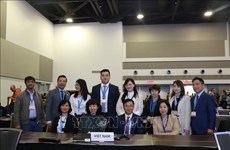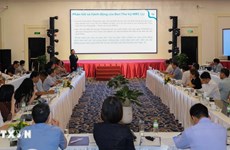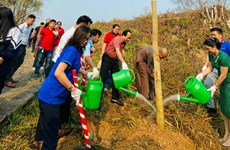ASEAN Leaders’ Statement on Joint Response to Climate Change
The 16 th ASEAN Summit adopted the ASEAN Leaders’ Statement on Joint
Response to
Climate Change in Hanoi on April 9.
The 16 th ASEAN Summit adopted the ASEAN Leaders’ Statement on Joint Response to
Climate Change in Hanoi on April 9.
Following is the full text of the statement:
We, the Heads of State/Government of Brunei Darussalam, the Kingdom of Cambodia, the Republic of Indonesia, the Lao People’s Democratic Republic, Malaysia, the Union of Myanmar, the Republic of the Philippines, the Republic of Singapore, the Kingdom of Thailand and the Socialist Republic of Viet Nam, Member States of ASEAN, on the occasion of the 16 th ASEAN Summit;
RENEWING our commitments made in the ASEAN Joint Statement on Climate Change to the 15 th session of the Conference of the Parties (COP) to the United Nations Framework Convention on Climate Change (UNFCCC) and the 5 th session of the Conference Parties serving as the Meeting of Parties (CMP) to the Kyoto Protocol (2009), the ASEAN Declaration on the 13 th session of COP to the UNFCCC and the 3 rd session of the CMP to the Kyoto Protocol (2007), and the ASEAN Declaration on Environmental Sustainability (2007);
Reaffirming that the UNFCCC and its Kyoto Protocol constitute the current legal framework and legal instrument for the international community to combat global climate change and that comprehensive, effective and binding outcomes of the Bali Roadmap are essential for furthering the implementation of the UNFCCC and the Kyoto Protocol and should be addressed by a consensus-based and transparent manner;
Further reaffirming the principle of equity and in accordance with their common but differentiated responsibilities and respective capabilities and national circumstances;
Understanding that while the Copenhagen Accord is not a legally binding instrument, it provides elements that could be considered as inputs to the two-track process of the Ad-hoc Working Group on Long-term Cooperative Actions (AWG-LCA) and the Ad-hoc Working Group on Further Commitments for Annex I Parties under the Kyoto Protocol (AWG-KP) aimed at reaching at a fair, equitable, and legally binding agreement that ensures a successful COP 16/CMP 6 in Mexico;
Noting the large number of countries associating themselves with the Copenhagen Accord;
Recognising that the Southeast Asian region is also vulnerable to climate change which will seriously affect most of aspects of livelihood and limit our development options for the future, including our efforts towards the achievement of the Millennium Development Goals;
Recognising the importance of sustainable forest management in ASEAN, which will contribute significantly to the international efforts to promote environmental sustainability and to mitigate the effects of climate change;
Sharing a vision for an ASEAN Community resilient to climate change, and supporting our national and global efforts to combat climate change consistent with our common but differentiated responsibilities and respective capabilities;
DO HEREBY DECLARE TO:
Towards a global solution to the challenge of climate change at COP 16/CMP 6
1. Reaffirm our right to sustainable development and resolve to achieve the ultimate objective of the UNFCCC to stabilise atmospheric greenhouse gas concentrations at a level that would prevent dangerous anthropogenic interference with the climate system and within a time-frame sufficient to allow ecosystems to adapt naturally to climate change, to ensure that food production is not threatened and to enable economic development to proceed in a sustainable manner;
2. Urge all Parties of UNFCCC to work together to secure a legally binding agreement, particularly to limit the increase in average global temperature to below 2 degrees Celsius above the pre-industrial level, and encourage all Parties concerned to engage in further discussions to elaborate appropriate provisions, which should be concluded at COP 16/CMP 6 in December 2010;
3. Urge developed countries to continue taking the lead by making more ambitious commitments and setting out specific and binding targets to reduce greenhouse gas emissions in the mid-term and long-term;
4. Call upon developed countries to support developing countries, and take full account of the specific needs and special situations of the least developed countries and those most affected by climate change, with adequate, predictable and sustainable financial resources, transfer of technology, as well as capacity enhancement to enable adaptation efforts and nationally appropriate mitigation actions by developing countries through effective and new institutional arrangements;
5. Urge all countries, particularly developed countries, to ensure that their existing and future unilateral policies and measures as well as market-based mechanisms in addressing climate change will not negatively affect international trade as well as the sustainable economic and social development of developing countries, taking into full account the specific needs and special situations of the least developed countries;
6. Urge developed countries to fulfill their obligations under the UNFCCC and to provide scaled-up, new and additional, adequate and predictable funding to the developing countries, taking into full account the specific needs and special situations of the least developed countries and those most affected by climate change which shall be provided with incentives to continue to develop on a low emission pathway;
7. Encourage all developing countries to make active contributions to the global efforts through the development and implementation of Nationally Appropriate Mitigation Actions (NAMAs) on a voluntary basis, in accordance with their different national circumstances, while welcoming adequate financial and technical support that is made available to them;
8 . Encourage South-South cooperation to support ASEAN Member States in addressing the impacts of climate change through technical cooperation and capacity building;
9. Reaffirm that agreement on and effective implementation of Reduced Emission from Deforestation and Forest Degradation (REDD)-plus mechanisms is critical for contributions by ASEAN Members States to mitigate emissions, and offers major opportunities for enhancing biodiversity conservation and sustainable use of natural resources, as well as supporting the livelihood of local communities in a sustainable manner;
10. Work constructively together to ensure that the outcome of COP 16/CMP 6 will incorporate long-term cooperative actions to address climate change in accordance with principles and provisions of the Convention and the Bali Action Plan, in particular on mitigation, adaptation, finance, technology transfer, capacity building and taking into account the specific national circumstances of Parties and a future agreement of the Second Commitment period of the Kyoto Protocol;
11. Commit to actively contribute towards a successful outcome of COP 16/CMP 6;
Towards an ASEAN Community resilient to climate change
12. Continue to exchange views among ASEAN Member States on international climate negotiations under the UNFCCC, before and in Mexico (COP 16/CMP 6) as well as other related international conferences. In this regard, the newly established ASEAN Working Group on Climate Change (AWGCC) should work extensively to develop a common understanding/position of ASEAN in the coming COP 16/CMP 6 in 2010 in line with the Bali Roadmap;
13. Urge the ASEAN Climate Change Initiative (ACCI) to actively provide a consultative platform to further strengthen regional coordination and cooperation addressing climate change;
14. Enhance scientific collaboration including on the following areas:
Downscaling of climate change effects according to different greenhouse gas emissions scenarios for the Southeast Asian region and for local areas according to multiple models;
Detailed climate change impact assessment, vulnerability assessment, adaptation options and needs for the Southeast Asian region and sub-regions such as BIMP-EAGA and Greater Mekong Sub-region;
Formulation of needs and opportunities for greenhouse gas emissions mitigation with both domestic and international support in, for example water resources management and peat land management, forestry, agricultural, industrial and domestic energy efficiency measures, renewable energy generation, and transportation;
15. Engage in cooperation in research and development and knowledge sharing, including on agricultural management and practices so as to enhance food production, agricultural productivity and water resources sustainability, while adapting to the adverse effects of climate change and mitigating greenhouse gas emissions from the sector, thus ensuring food security in the ASEAN region;
16. Commit ourselves to promoting programmes for raising domestic awareness on climate change and to inculcate habits towards a low emissions society, including through enhancement of education on climate change;
17. Incorporate mitigation and adaptation strategies into national development strategies and policies in line with sustainable development;
18. Enhance ASEAN participation towards strengthening international cooperation/efforts to address climate change and assess its impacts on socio-economic development, health, environment and water resources , including activities on building adaptive capacities and supporting mitigation and adaptation actions;
19. Encourage cooperation with other regional and sub-regional institutions such as, inter-alia, the Greater Mekong Sub-region and the Mekong River Commission (MRC), while welcoming the outcomes of the First Summit of the MRC in Thailand on 4-5 April 2010, which were reflected in the “Declaration on Meeting the Needs, Striking the Balance: Towards the Sustainable Development of the Mekong River Basin” highlighting the sustainable use, management and development of water and related resources.
20. Collaborate on environmentally-sound technologies, towards low carbon and green economy;
21. Consider the possibility of developing an ASEAN action plan to better understand and respond to climate change;
22. Develop ASEAN climate change impact scenarios as the foundation to conduct an ASEAN report on climate change impact assessment so as to provide inputs to the Fifth Assessment Report (AR 5) of the United Nations Intergovernmental Panel on Climate Change (IPCC) in 2015, taking into account related initiatives in other multilateral fora;
23. Strengthen ASEAN collaboration and cooperation with a view to enhancing regional awareness on environment, environmentally-sound technology and climate change towards better, research and education on these matters in the region./.
Following is the full text of the statement:
We, the Heads of State/Government of Brunei Darussalam, the Kingdom of Cambodia, the Republic of Indonesia, the Lao People’s Democratic Republic, Malaysia, the Union of Myanmar, the Republic of the Philippines, the Republic of Singapore, the Kingdom of Thailand and the Socialist Republic of Viet Nam, Member States of ASEAN, on the occasion of the 16 th ASEAN Summit;
RENEWING our commitments made in the ASEAN Joint Statement on Climate Change to the 15 th session of the Conference of the Parties (COP) to the United Nations Framework Convention on Climate Change (UNFCCC) and the 5 th session of the Conference Parties serving as the Meeting of Parties (CMP) to the Kyoto Protocol (2009), the ASEAN Declaration on the 13 th session of COP to the UNFCCC and the 3 rd session of the CMP to the Kyoto Protocol (2007), and the ASEAN Declaration on Environmental Sustainability (2007);
Reaffirming that the UNFCCC and its Kyoto Protocol constitute the current legal framework and legal instrument for the international community to combat global climate change and that comprehensive, effective and binding outcomes of the Bali Roadmap are essential for furthering the implementation of the UNFCCC and the Kyoto Protocol and should be addressed by a consensus-based and transparent manner;
Further reaffirming the principle of equity and in accordance with their common but differentiated responsibilities and respective capabilities and national circumstances;
Understanding that while the Copenhagen Accord is not a legally binding instrument, it provides elements that could be considered as inputs to the two-track process of the Ad-hoc Working Group on Long-term Cooperative Actions (AWG-LCA) and the Ad-hoc Working Group on Further Commitments for Annex I Parties under the Kyoto Protocol (AWG-KP) aimed at reaching at a fair, equitable, and legally binding agreement that ensures a successful COP 16/CMP 6 in Mexico;
Noting the large number of countries associating themselves with the Copenhagen Accord;
Recognising that the Southeast Asian region is also vulnerable to climate change which will seriously affect most of aspects of livelihood and limit our development options for the future, including our efforts towards the achievement of the Millennium Development Goals;
Recognising the importance of sustainable forest management in ASEAN, which will contribute significantly to the international efforts to promote environmental sustainability and to mitigate the effects of climate change;
Sharing a vision for an ASEAN Community resilient to climate change, and supporting our national and global efforts to combat climate change consistent with our common but differentiated responsibilities and respective capabilities;
DO HEREBY DECLARE TO:
Towards a global solution to the challenge of climate change at COP 16/CMP 6
1. Reaffirm our right to sustainable development and resolve to achieve the ultimate objective of the UNFCCC to stabilise atmospheric greenhouse gas concentrations at a level that would prevent dangerous anthropogenic interference with the climate system and within a time-frame sufficient to allow ecosystems to adapt naturally to climate change, to ensure that food production is not threatened and to enable economic development to proceed in a sustainable manner;
2. Urge all Parties of UNFCCC to work together to secure a legally binding agreement, particularly to limit the increase in average global temperature to below 2 degrees Celsius above the pre-industrial level, and encourage all Parties concerned to engage in further discussions to elaborate appropriate provisions, which should be concluded at COP 16/CMP 6 in December 2010;
3. Urge developed countries to continue taking the lead by making more ambitious commitments and setting out specific and binding targets to reduce greenhouse gas emissions in the mid-term and long-term;
4. Call upon developed countries to support developing countries, and take full account of the specific needs and special situations of the least developed countries and those most affected by climate change, with adequate, predictable and sustainable financial resources, transfer of technology, as well as capacity enhancement to enable adaptation efforts and nationally appropriate mitigation actions by developing countries through effective and new institutional arrangements;
5. Urge all countries, particularly developed countries, to ensure that their existing and future unilateral policies and measures as well as market-based mechanisms in addressing climate change will not negatively affect international trade as well as the sustainable economic and social development of developing countries, taking into full account the specific needs and special situations of the least developed countries;
6. Urge developed countries to fulfill their obligations under the UNFCCC and to provide scaled-up, new and additional, adequate and predictable funding to the developing countries, taking into full account the specific needs and special situations of the least developed countries and those most affected by climate change which shall be provided with incentives to continue to develop on a low emission pathway;
7. Encourage all developing countries to make active contributions to the global efforts through the development and implementation of Nationally Appropriate Mitigation Actions (NAMAs) on a voluntary basis, in accordance with their different national circumstances, while welcoming adequate financial and technical support that is made available to them;
8 . Encourage South-South cooperation to support ASEAN Member States in addressing the impacts of climate change through technical cooperation and capacity building;
9. Reaffirm that agreement on and effective implementation of Reduced Emission from Deforestation and Forest Degradation (REDD)-plus mechanisms is critical for contributions by ASEAN Members States to mitigate emissions, and offers major opportunities for enhancing biodiversity conservation and sustainable use of natural resources, as well as supporting the livelihood of local communities in a sustainable manner;
10. Work constructively together to ensure that the outcome of COP 16/CMP 6 will incorporate long-term cooperative actions to address climate change in accordance with principles and provisions of the Convention and the Bali Action Plan, in particular on mitigation, adaptation, finance, technology transfer, capacity building and taking into account the specific national circumstances of Parties and a future agreement of the Second Commitment period of the Kyoto Protocol;
11. Commit to actively contribute towards a successful outcome of COP 16/CMP 6;
Towards an ASEAN Community resilient to climate change
12. Continue to exchange views among ASEAN Member States on international climate negotiations under the UNFCCC, before and in Mexico (COP 16/CMP 6) as well as other related international conferences. In this regard, the newly established ASEAN Working Group on Climate Change (AWGCC) should work extensively to develop a common understanding/position of ASEAN in the coming COP 16/CMP 6 in 2010 in line with the Bali Roadmap;
13. Urge the ASEAN Climate Change Initiative (ACCI) to actively provide a consultative platform to further strengthen regional coordination and cooperation addressing climate change;
14. Enhance scientific collaboration including on the following areas:
Downscaling of climate change effects according to different greenhouse gas emissions scenarios for the Southeast Asian region and for local areas according to multiple models;
Detailed climate change impact assessment, vulnerability assessment, adaptation options and needs for the Southeast Asian region and sub-regions such as BIMP-EAGA and Greater Mekong Sub-region;
Formulation of needs and opportunities for greenhouse gas emissions mitigation with both domestic and international support in, for example water resources management and peat land management, forestry, agricultural, industrial and domestic energy efficiency measures, renewable energy generation, and transportation;
15. Engage in cooperation in research and development and knowledge sharing, including on agricultural management and practices so as to enhance food production, agricultural productivity and water resources sustainability, while adapting to the adverse effects of climate change and mitigating greenhouse gas emissions from the sector, thus ensuring food security in the ASEAN region;
16. Commit ourselves to promoting programmes for raising domestic awareness on climate change and to inculcate habits towards a low emissions society, including through enhancement of education on climate change;
17. Incorporate mitigation and adaptation strategies into national development strategies and policies in line with sustainable development;
18. Enhance ASEAN participation towards strengthening international cooperation/efforts to address climate change and assess its impacts on socio-economic development, health, environment and water resources , including activities on building adaptive capacities and supporting mitigation and adaptation actions;
19. Encourage cooperation with other regional and sub-regional institutions such as, inter-alia, the Greater Mekong Sub-region and the Mekong River Commission (MRC), while welcoming the outcomes of the First Summit of the MRC in Thailand on 4-5 April 2010, which were reflected in the “Declaration on Meeting the Needs, Striking the Balance: Towards the Sustainable Development of the Mekong River Basin” highlighting the sustainable use, management and development of water and related resources.
20. Collaborate on environmentally-sound technologies, towards low carbon and green economy;
21. Consider the possibility of developing an ASEAN action plan to better understand and respond to climate change;
22. Develop ASEAN climate change impact scenarios as the foundation to conduct an ASEAN report on climate change impact assessment so as to provide inputs to the Fifth Assessment Report (AR 5) of the United Nations Intergovernmental Panel on Climate Change (IPCC) in 2015, taking into account related initiatives in other multilateral fora;
23. Strengthen ASEAN collaboration and cooperation with a view to enhancing regional awareness on environment, environmentally-sound technology and climate change towards better, research and education on these matters in the region./.













